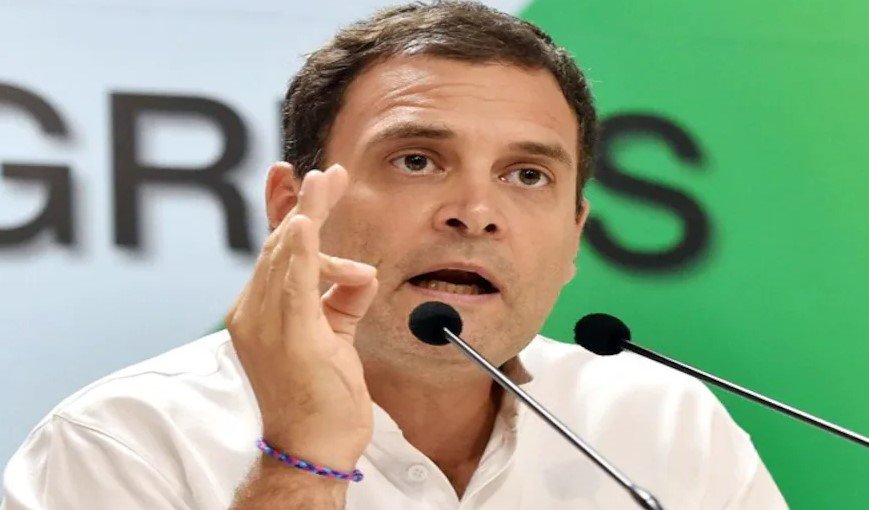Congress leader’s remarks on Operation Sindoor spark fierce pushback from ruling party as BJP urges him to ‘believe Tharoor’ and stop spreading foreign narratives
Rahul Gandhi’s fiery speech in Bhopal on Tuesday has kicked up a political storm in Delhi — and Islamabad, indirectly. His claim that Prime Minister Narendra Modi “surrendered” under foreign pressure to call off India’s counter-offensive, Operation Sindoor, has triggered sharp reactions from BJP leaders who accuse him of echoing enemy lines.
The Congress MP and Leader of the Opposition in Lok Sabha now finds himself facing serious allegations — not just of political immaturity, but of aiding what the BJP calls “Pakistani propaganda.”
BJP Hits Back, Doubles Down
It didn’t take long for the BJP machinery to respond. Leading the charge was party spokesperson Shehzad Poonawala, who dismissed Gandhi’s accusations outright, calling them “outrageous and misleading.”
One sentence was enough to set off alarms: “PM Modi surrendered under foreign pressure.”
According to Poonawala, this isn’t just a political attack — it’s a breach of national responsibility. “Rahul Gandhi has once again misunderstood his role as the LoP — it doesn’t mean Leader of Pakistan’s Propaganda,” he quipped.
That barb wasn’t just metaphorical. Poonawala said Gandhi’s statement gave undue credibility to Pakistan’s version of recent military events. “Even Pakistan didn’t spin it this well,” he said.

Tharoor, Tewari, Khurshid: Internal Voices Cited
Interestingly, the BJP isn’t just relying on its own voice to counter Gandhi. They’ve asked him to listen to senior members of his own party.
Poonawala referenced:
-
Shashi Tharoor, who publicly stated that there was no US mediation involved.
-
Manish Tewari, another Congress veteran, who echoed that position.
-
Salman Khurshid, former external affairs minister, who maintained that India acted independently.
“If you don’t want to trust the army or the MEA, then at least trust your own party,” Poonawala said.
Operation Sindoor: A National Pulse Point
Operation Sindoor, launched after a terror attack in Pahalgam killed 27 Indian civilians, had generated rare unity across party lines. The cross-border retaliation was seen by many as a strong, clear response.
Until Rahul Gandhi’s remarks, that is.
The Congress leader’s comments raised eyebrows by suggesting the operation was halted not due to a successful outcome or military assessment, but because of “external pressure” — allegedly from Washington.
The Ministry of External Affairs and the Indian Army’s Directorate General of Military Operations (DGMO) had already clarified earlier: Pakistan had initiated contact to seek de-escalation.
Why This Hits a Nerve
This isn’t just about one comment. It taps into deeper insecurities — both within Indian politics and the broader geopolitical narrative.
Pradeep Bhandari, BJP’s national spokesperson, said Gandhi’s statements were “indecent” and accused him of lacking patriotism.
“This isn’t just an insult to the Prime Minister. It’s a disrespect to every soldier who took part in Operation Sindoor,” he said.
He also questioned whether Gandhi was aware of the strategic implications his words carried on international platforms.
Timing and Optics Matter
The timing couldn’t be worse for Congress. Just days ago, India received praise from several foreign capitals for maintaining “military restraint with strategic clarity” following the Kashmir terror incident.
Now, Gandhi’s remark threatens to shift the spotlight from India’s diplomacy to internal confusion.
In one small sentence, he may have weakened a carefully built consensus.
Not the First Time
This isn’t the first time Rahul Gandhi’s remarks have come under fire for sounding, well, foreign.
Past controversies include:
-
Referring to the Indian government as a “dictatorship” during speeches abroad.
-
Raising the Rafale issue in a manner later fact-checked by France’s Dassault Aviation.
-
Using terms such as “lynchistan” during foreign policy interviews.
BJP leaders argue that Gandhi often finds himself more aligned with international critics of India than with domestic realities.
Social Media Reactions: Mixed and Messy
Twitter exploded — as it often does — with hashtags like #RahulSurrender and #PakistaniPropaganda trending in India by Tuesday evening.
Some users called for an apology. Others defended Gandhi’s right to question the government, even during national security matters. The usual ideological camps retreated into familiar trenches.
A few reactions included:
-
“This isn’t dissent, this is disgrace,” tweeted a former Indian Army officer.
-
“When did asking questions become anti-national?” posted Congress Youth leader Kanhaiya Singh.
Political Risk vs. Political Identity
For Gandhi, this is a tightrope walk. He’s trying to craft a bold, combative image ahead of the next elections. But each time he tries to take the fight to Modi, he ends up sparking debates that derail his messaging.
It raises a fundamental question: Can the Congress Party present itself as a serious national security stakeholder if its leader keeps being accused of siding with narratives India has spent decades dismantling?
